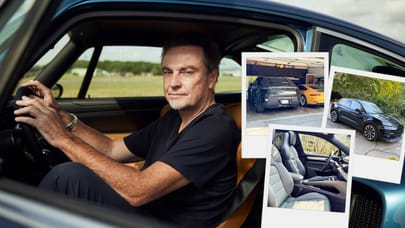
"Terror and excitement": Lord March on the Goodwood FoS
Ahead of this weekend’s big garden party, Jason Barlow grabs the FoS patron for a rare interview
The Goodwood Festival of Speed will see the world debut of Aston Martin's 800bhp Vulcan, and the UK's first look at the Ferrari 488 GTB, Ford Focus RS, Koenigsegg Regera and Lord knows what else.
Ahead of this weekend's speedy festivities, TopGear.com managed to secure a rare audience with Lord March, the man who surrenders his front garden and driveway every year so that 140,000 people can watch a load of racing drivers run riot in the most exciting new supercars and most revered historics.
Is he mad? Or could he in fact be the cleverest man in the car industry?
TopGear.com: How do you measure the success of an event?
Lord March: [pause] How's the driving been? Is everyone OK? You know, it's not great to spend the weekend in A&E. I worry about the weather, too, perhaps more than I should. It's nice when the sun's out and everyone's in a good mood.
The operational stuff bothers me, too - how long does it take getting in and out, can people get food easily... the stuff that drives you mad when it doesn't work. I don't like to see massive queues outside the loos, either.
TG: You were the on-set stills photographer for Stanley Kubrick during the making of Barry Lyndon in the mid-1970s...
LM: I fell into it. I was incredibly lucky to be around someone like that, especially as I was only 17. Ken Adam [legendary cinema figure who designed the sets on the 1960s Bond movies] was the art director.
Listening to Stanley all day, compromise was never an accepted thing. Of course, you do have to compromise, but it's about doing so in the way that causes the least damage to what you're trying to do.
If it took another week to make something one per cent better, then Stanley would take another week.
Top Gear
Newsletter
Thank you for subscribing to our newsletter. Look out for your regular round-up of news, reviews and offers in your inbox.
Get all the latest news, reviews and exclusives, direct to your inbox.
TG: Kubrick was famously fanatical about detail. You clearly have that trait, too. Is that part of the success of the Festival of Speed, Member's Meeting and Revival?
LM: We need people here who really get it, who care that it's consistent. It is about detail, a mass of detail that has to come together to create a result.
It's also about how we position the different events, so that they have a different feel. We all understand how important that is. What's right for one might be completely wrong for another.
TG: There is some criticism that Goodwood's FOS is now too popular. Can something be too successful?
LM: People say, "this has changed, or that's changed." For me, in terms of my vision for it, nothing has changed. There are certainly more people attending.
If luxury is about doing something in a simple way, that involves the individual in something very intimate, then the Member's meeting is closer to ‘luxury'.
TG: The FOS and Revival Meeting now have a worldwide reputation, gone beyond cars and motorsport to stand for something that could only be British. So what's next? Would you open a Goodwood-branded hotel in Shanghai, for example?
LM: We might. But it would be a very risky thing to do. It's a tricky one.
In terms of events, the challenge 20 years ago was to be the first luxury experience company. Then what happens is that those experiences, in an ideal world, should become the marketing thrust for something else.
The question is, what's the something else? So we are looking at growing the brand. But we're more interested in trying to take the brand round the world than we are in taking the events round the world. We wouldn't put a motor racing event on in the US, for example.
It's all about being here, so the challenge is how we talk to the billion people who obviously can't physically be here. We might do an event for somebody, but to do a Goodwood Festival of Speed in Shanghai, where we wouldn't have complete control... No.
TG: The sky's the limit...
LM: [firmly] But I don't think we should be all things to all people. We need to be very careful about what we do. Anything we do on the estate has to fit with our philosophy.
Would we want to host a Rolling Stones concert on the grounds? Probably not. Because there are plenty of other organisations that can do that for them.
TG: Does the scale of the Goodwood operation in 2015 surprise you?
LM: We never dreamt it would grow to this size, of course we didn't. We didn't realise how gripped and enthusiastic people would be.
That's the greatest trip for us, putting things in and seeing how warmly people respond to it. We're lucky, there's a lot of affection for the place. I think we've been hugely lucky with the history and authenticity.
People really do want integrity - don't under-estimate their ability to see through things that are lacking. What we do here is real. We don't have to make much of it up. It's always happened here.
You know, it's a relief to me that Apple is the number one in what it does. The biggest company in the world, in fact. It would seem so strange to me if it wasn't number one. Clearly, people do actually care about these things...
TG: The Festival of Speed also seems to have hastened the demise of the traditional motor show. Are you pleased about that?
LM: We'd like to think we've helped get things on a new path, and that we're benefitting the British car industry. In industry terms, we'd like to play a bigger role actually, bring people together, get them closer to the cars, help the industry and customers get even more immersed.
We need to get the heavy hitters here, and do things that are more relevant for them. Fortunately, people are mostly keen to come.
TG: Do you have a favourite automotive or motorsport era?
LM: [long pause] The early 1960s. You could argue that the late 1940s to the 1960s was the most glamorous time for motor racing, and Goodwood played a big part in the sport during that time.
We've got real rights to that moment. It's a good feeling that I can remember being here when I was six. There was a big gap after that, but time has a way of truncating that.
TG.com: It's 22 years since the first FOS. How do you manage the pressure of constantly trying to outdo what you've achieved the year before?
LM: The first day of the very first Festival Of Speed was equal parts terror and excitement. I couldn't believe how many people turned up, in the end.
We negotiated with the local authority for seven days in the run-up to the first Revival meeting, and only got the planning permission at the last moment. We'd decided to do it anyway.
There should be a headline-grabbing element which sets each year apart. But really, we don't particularly try to be better, we just want it to be good. I don't believe in putting things off until next year, though. If there's a chance in hell of getting something or someone here, then just do it.
You simply have to make things happen. But as well as it goes, I can tell you that nobody here is ever complacent. There are a lot of sleepless nights...
Trending this week
- Car Review
BMW 1 Series








